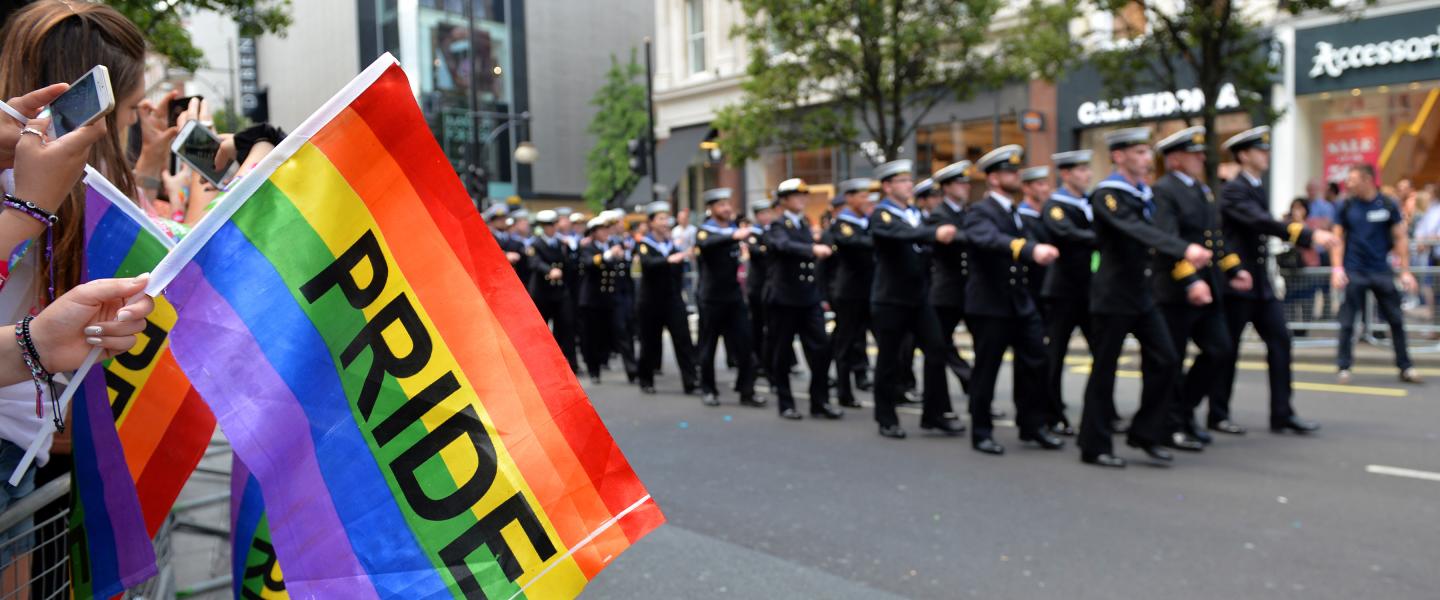“The need for positive role models in the maritime industry is clear”
The UK has come a long way in a relatively short period of time in terms of equal rights for the LGBT+ community. There have been some huge steps towards equality with the equalising of the age of consent to 16 years old in 2001, transgender people being able to legally change their gender in 2005 and the introduction of equal marriage in 2014. The UK is now one of the most liberal countries with respect to equal rights for LGBT+ people. However, with that comes the question: Do we still need to have Pride events? Surely, everything we’ve been campaigning for over the last few decades has been achieved so why does Pride still matter?

The Royal Navy contingent march through London during the London Community Pride parade. 2015.
The answer is remarkably simple. If people feel that they can’t be themselves in either their personal or professional lives, then there is still a need to campaign for change. Despite all the partying, rainbows and frivolity, Pride events are integral to driving through change and increasing acceptance of LGBT+ people. It’s about being able to stand up and say ‘I am who I am and I am proud of it’. From a personal point of view, wearing full uniform and marching through London with the Naval Service was a real stand out moment in my life and something that would have been impossible prior to the lifting of the ban on homosexuals in the Armed Forces in 2000. As a member of the Royal Fleet Auxiliary, I am included in the Royal Navy’s COMPASS network despite being a civilian. The RFA is a unique organisation that sits in-between the Merchant Navy and the Royal Navy: neither one thing nor the other. My experiences of being ‘out’ in the RFA and Naval Service are well documented and have been very positive but how reflective of the Merchant Navy are those experiences? Given that I’m a female and I sail with the RFA, you could argue that they’re not at all representative of the Merchant Navy.

Author: Sarah L. Stevens, Cadet (X), Royal Fleet Auxiliary
History tells us that gay men have always been at sea, the stereotyped view of the gay sailor is almost ingrained in our culture but what is it like to be a gay man in the Merchant Navy in 2016? I spoke with a man in his mid-thirties who sails with a multi-national crew doing worldwide voyages. His experiences have been wildly different to mine. He is gay and wishes to remain anonymous. Despite being out to close friends and family, he doesn’t feel he can be out at work and crucially he’s never met another gay shipmate. There is the chance that he may well have sailed with many other gay people but the fear of not being accepted, may have meant his colleagues also weren’t able to come out. He feels that knowing there was someone else on board, or even in the company, who was gay may help him to be more open about his sexuality. Simple but important things like his employer having robust LGBT+ policies would also make it easier for him to be open and himself at work. Luckily he hasn’t had any cause to have to consult the non-existent policies but that doesn’t detract from the need for a company to show that they treat everyone equally regardless of sexual orientation or gender identity.
The need for positive role models in the maritime industry is clear and whilst there is still a reluctance for people to bring their whole self to work, Pride events are still important. I look forward to the day when my colleagues in the Merchant Navy will wear their uniforms with pride and march through the streets without fearing that their working lives will suffer because of their gender or who they fall in love with.
Pride 2016 – Download the App from ThomsonReuters
_
Human Rights at Sea fully supports the LGBT+ community and specifically those individuals serving at sea. The charity considers that issues of diversity, gender and non-discrimination should be at the forefront of Corporate Social Responsibility policies and actions. Human Rights at Sea has a zero tolerance for abuse towards the LGBT+ community.
